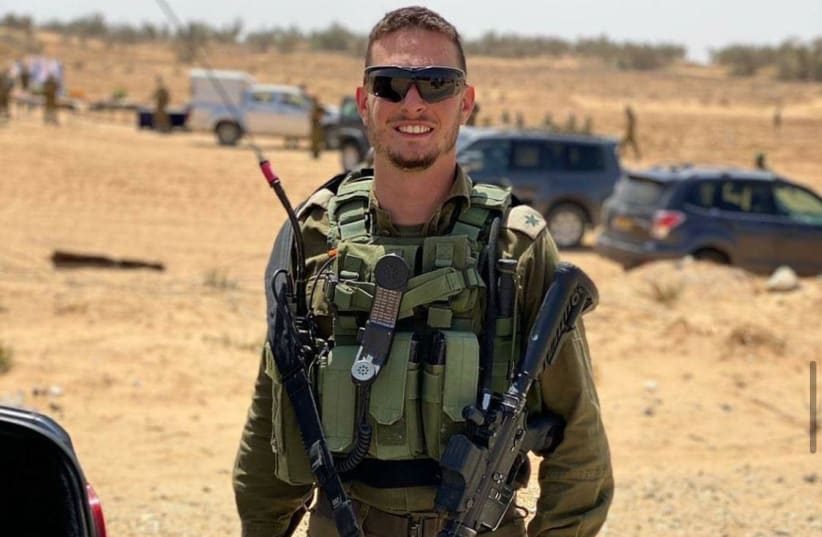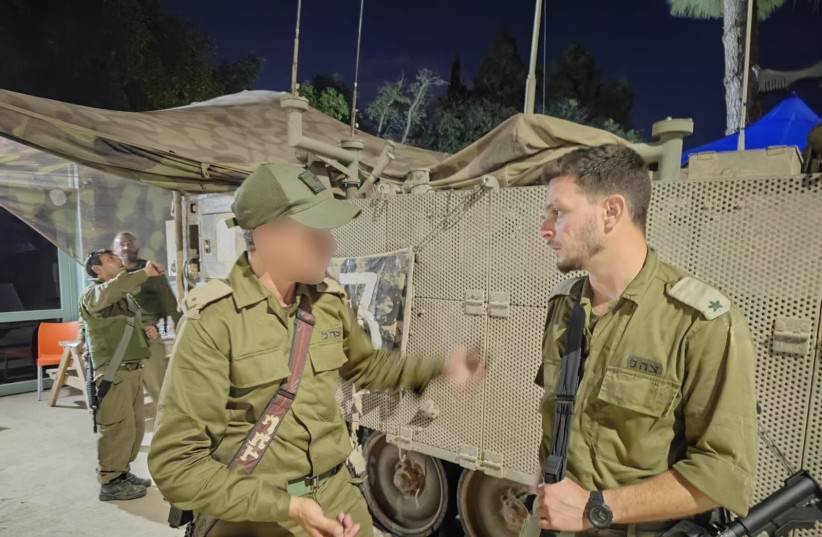On October 7, Yuval de Paz, 29, was at home with his girlfriend when he heard the sirens.
De Paz serves as what he estimates would be the equivalent of a major, in the 5th Givati Reserve Brigade. No one in his brigade, including De Paz, who is studying data science, imagined they would be urgently called in for duty on a Shabbat morning.
Still, he would nevertheless end up being among the first ones in the IDF to confront the gangs of Hamas killers that terrorized and murdered their way across Israel’s southern communities two weeks ago.
This is especially the case as a member of a reserve brigade, as opposed to a mandatorily enlisted soldier, where going to battle means leaving directly from your home, leaving your family behind.
“I remember I was in the living room and I heard the siren,” he said. “And I also have a friend, who, his job is in the south brigade of the Gaza Strip [periphery]. He called me during the alarm, and he said to me, ‘man, I have this major event in my area.”
The friend, whose name was not disclosed, works with the security authority pertaining to the communities in the south near Gaza. He proceeded to inform De Paz that he had been alerted to the presence of terrorists inside these peripheral communities.
In the next 10 minutes, De Paz received the photos that were quickly plastered across social media, including one showing numerous armed Hamas terrorists in a white truck pulling up a residential street.
“In that moment when I saw the pictures on my TV, I knew there was going to be a war,” he said.
Immediately, he packed his bag, throwing in his uniform, socks, and everything else he would need.
A message quickly came in from the Brigade Commander to get to the base.
The first rocket alarms sounded that morning just before 6:30 a.m. in Israel. By 9:30 a.m., the brigade had all reported at the base.
De Paz’s brigade then began to take all the equipment they would need from warehouses.
36-hour mobilization in 10 hours
Normally, he said, “This process takes about 36 hours. But because of the events, we did it in like 10 hours so we can get down to the south as quickly as possible to be available to fight the terrorists.”
Upon arrival, they still didn’t know what their mission would be.
As it happened, they were immediately assigned to protect the communities in the area of the Gaza periphery, such as Netiv HaAsara, Magen, and Kissufim.
De Paz describes being able to drive their vehicles directly into the communities because the fences and walls that had been there had been destroyed when Hamas attacked them.
“The first mission was to protect the cities from inside the cities. You put a bunch of soldiers in, you put a position around the cities.”
They also put troops outside during the night to watch the border fence. The task they were charged with was simple, but crucial: defend.
It’s a 24-hour job, one that De Paz is happy to do, even if it means getting as few as two non-consecutive hours of sleep each night.
“When [a terrorist] comes to the fence with guns and vehicles, we just need to destroy them,” De Paz said. “[We can] not let them get over the border.”
De Paz works in the communications room, coordinating Israel’s defense efforts in real time. He describes watching first-hand and on live video on the front lines as terrorists attempt to penetrate into Israel and kill more Israelis.
“We actually see a lot of terrorists sneaking out at night, crawling to the border, coming with vehicles. They want to make it over the border [through] the holes in the fence. And if [a terrorist] gets through, after the border, he can just wander into the [nearby Israeli] cities,” he explained.
“When we saw them trying [to infiltrate into Israel] we closed the circle with our fire.”
De Paz, working the communications systems from within the brigade’s radio office, coordinates fire from mortars and the air force, conducting Israel’s defense so that Israel’s various military branches work in cohesion with one another.
He reports remarkable successes in eliminating terrorist threats in this manner. He expresses that the focus is on continuing to operate effectively and successfully, and doesn’t offer a guess on what might come in the next stages of the fight against Hamas.
He did, however, emphasize that Israel will win.
“[To] everybody in the world, every terrorist group, every organization that wants to test us: we are here, we are doing our job, and the job is to protect the Israeli people. We do it at day, at night, during Shabbat, whenever. We are here, we are ready.”

